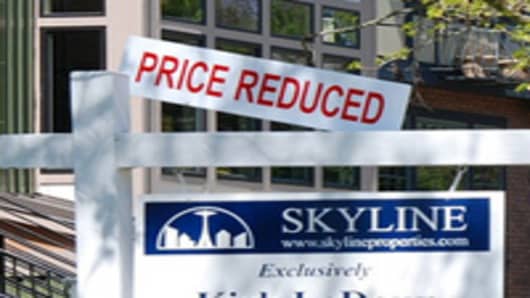The housing recovery remains weak and could take a turn for the worse if more Americans lose their jobs, analysts say.
"The market’s incredibly fragile," says Mark Zandi, chief economist at Moodys. "As long as job losses are rising, the housing market is at risk of continuing along a decline. Any recent stability would be in danger."
The unexpected drop in existing home sales for August was the latest sign of just how tentative the recent signs of recovery are.
The US job picture does seem to be improving. The number of workers filing new claims for jobless benefits unexpectedly fell 21,000 last week, government data showed on Thursday.
But if the jobless numbers start going up or even remain at current levels, that will create a 1-2 punch against a housing recovery. More job losses mean more foreclosures, and that means lower home prices.
"Changes in the economy and jobs would hurt housing," says Cindy McClellan, a real estate broker in Denver, Colorado. "The market's been somewhat stable here but job losses would put the breaks on a recovery very fast. Foreclosures, because of job losses, will push prices down and hurt sales."
While lower prices have made home buying affordable for many, they create a nearly impossible situation for sellers who are trying to move up to bigger home. The lower prices put homeowners 'underwater' where they owe more on their mortgage than the house is currently worth.
"Being 'underwater' keeps the market down," says Greg McBride, senior analyst at Bankrate. "Sellers don't have the equity they did years ago. They end up not selling or renting at best."
Even if a home isn't 'underwater' tighter appraisals make it worth less on the market.
"Banks are enforcing a certain amount of caution when it comes to appraisals," says Ellen Bitton, CEO of Park Avenue Mortgage in New York City. "There are problems with regulations and where there was too much collusion in the past, now appraisers don't even know the neighborhood. They're being very conservative."
What has helped housing in recent months, analysts say, has been the first time homebuyer tax credit of $8,000. But that is scheduled to end on November 30th and should be extended, says Walter Maloney, spokesman for the National Association of Realtors.
"The tax credit has really been a catalyst," Walter Maloney says. "We've seen a sustained gain in sales in recent months because of it. We need to extend it for all home buyers--and even to commercial real estate."
Also helping sales are the low interest rates. Numbers released Thursday show interest rates on the 30-year fixed-rate mortgage averaged 5.04 percent, with an average 0.6 point, for the week ending Sept. 24. That is the lowest rate since 4.91 percent in the week ending May 28.
But some experts say lower interest rates alone won't keep the market recovering.
"They're not enough," says McCellan. "If you don't have a job, lower rates won't help you get a home or sell yours."
A housing slowdown may already be in the works says NAR's Maloney.
"No one should be surprised if sales go down in November," Maloney says. "We've had a surge becasue of the tax credit but many homebuyers may pull back if the tax credit is not renewed and home prices continue to fall."
High end homebuyers and sellers are still having problems says Bitton. "Jumbo loans still don't have a secondary market and there's not much help for them from the government. The rates for jumbos are still too high in comparison to the average 30 year fixed."
While analysts believe housing will make a recovery in the second half of next year, they say it's going to depend on the job market.
"What are the drivers of housing? One is jobs and income," says Frank Nitschke, director at CW Capital, a commercial real estate finance and investment management company. "You need a rebound in jobs and income to have sustainable rebound in housing."



